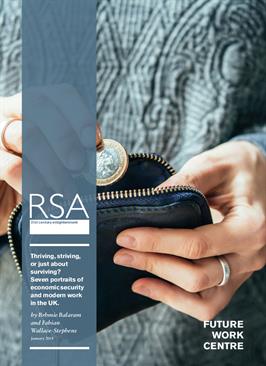The very nature of work has been changing in recent years as, for example, the gig economy develops and automation takes off. For some, the labour market has been radically transformed, but for others their experience of work has remained constant – and not necessarily for the better. As our seven portraits of modern work reveal, problems with economic security and the quality of work are pervasive across the labour market.
The RSA carried out a survey and segmentation of the British workforce in partnership with Populus to explore the state of good work in the UK. Good work, in essence, captures the two most important considerations for many people when pursuing a job – the offer of economic security and a rewarding experience.
We set out to better gage experiences of economic security, which we define as the ‘degree of confidence that a person can have in maintaining a decent quality of life, now and in future, given their economic and financial circumstances.’ For a third (or even as much as 40 percent) of our sample, this degree of confidence can be low; for a significant minority, their insecurity is extreme – these workers are precarious. Our segmentation reveals that in addition to experienced insecurity, there is hidden insecurity; for example, some workers are in steady jobs, but have little to no savings and wouldn’t be able to tide themselves over in the event of a financial shock.
We also intended to learn more about experiences of work. We found that these experiences are highly variable but, on the whole, most workers in the UK feel positively about their experiences on the job and would work even if they didn’t need the money. However, some workers are really struggling. These workers may not feel like they are adequately supported or protected in their jobs, they lack autonomy or a sense of freedom and control in work, and they feel so stressed and unfulfilled by their jobs that they report being unhappy.
While we are encouraged by the enthusiasm for good work among businesses, trade unions and government, there are still great challenges ahead. We are not convinced that traditional ‘objective’ measures of security, such as contract type or employment status, are sufficient, nor do they reflect the scale of these challenges. To understand the modern experience of work – and how we can improve it – a wider lens is needed and we have endeavoured to provide that here.
Our segmentation helped us identify patterns in experiences of economic security and work, which are ultimately expressed as the seven portraits of modern workers presented in this report. To bring these portraits to life, we’ve included case studies, compiled from supplementary interviews we conducted with workers who participated in our survey. Check out our report and use our interactive tool to find out which portrait best reflects your experience of work.
Download the report: Thriving, striving, or just about surviving? Seven portraits of economic security and modern work in the UK (PDF, 3MB)
Read online about the 7 portraits of modern work in the UK (on Medium)
Explore the 7 portraits through an online interactive tool
This is the first report of the RSA Future Work Centre, a programme that aims to bring about a better world of work through a combination of rigorous research and practical experiments.
pdf 3 MB
Contributors


Related reports
-
Make it authentic: Teacher experiences of youth social action in primary schools
Nik Gunn Aidan Daly Mehak Tejani
Youth social action brings all sorts of benefits to young people and communities. But how do teachers experience it? And what can we learn from that experience?
-
Preventing school exclusions: collaborations for change report
Mehak Tejani Benny Souto Aidan Daly
School exclusion can change the course of a young person’s life. It can have long-term implications for their health, wellbeing, and future opportunities.
-
Digital innovations in lifelong learning: a global perspective
Veronica Mrvcic James Richardson Amy Gandon Aoife O'Doherty
Digital innovations in lifelong learning: a global perspective explores the drivers that support and the barriers that limit the international reach and impact of digital lifelong learning innovations.



